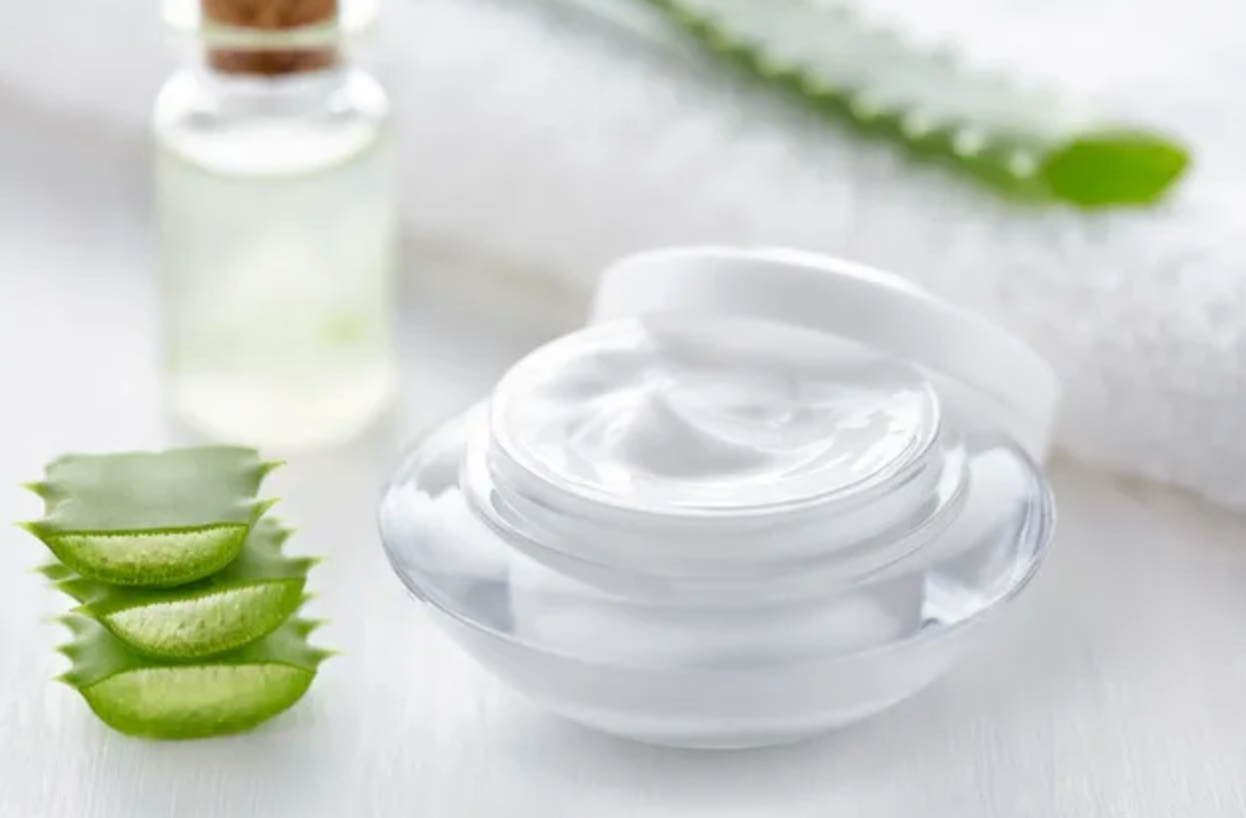
8 Potential Health Benefits of Aloe Vera
I bet you know that Aloe Vera is good for you? But what are the actual benefits?
Aloe vera is widely known for its medicinal properties. Whether you’re struggling with digestive problems or glucose control, here’s a look at some of the purported healing benefits of the popular plant.

Aloe vera plants are easy to grow and maintain, but when it comes to their components, these plants may do more than simply offer character to a living space.
The leaves of an aloe vera plant are packed with a soft clear gel that’s been praised for its hydrating effect and other medicinal benefits. In fact, past research notes that aloe vera has been used for centuries by people in Greece, Egypt, India, Mexico, Japan, and China for its purported wellness perks. But what about today?
Here's a look at some of the scientific research on aloe vera and some perspective about eight of its touted health benefits. Also, before taking any plant or plant-derived supplements to replace or complement your prescribed treatment plan, check with your healthcare team.
6 Health Benefits Of Aloe
1. Aloe Vera Gel Powder May Help Lower Blood Pressure
Hypertension, or high blood pressure, is a “silent killer,” according to the American Heart Association (AHA). Even though some people don't display any signs or symptoms of the condition, high blood pressure can slowly damage blood vessels, putting them at risk for a stroke, heart attack, and other complications.
To be clear, aloe vera is no substitute for exercise, healthy eating, and medication — all of which can help to reduce high blood pressure, per the AHA. But it might offer some benefit as a complementary therapy.
In a past study, 90 people with diabetes who were not dependent on insulin received either 100 milligrams (mg) of aloe vera gel powder, 200 mg of aloe vera gel powder, or no treatment for three months. The aloe vera groups also received nutritional counseling.
When researchers evaluated the subjects after three and six months, they found that aloe vera powder helped reduce the systolic and diastolic blood pressures of both groups. Researchers posited that this may be the result of two anti-inflammatory components in aloe vera — aloe-emodin and aloin — and past research has shown these two components have anti-inflammatory properties in both rat and in vitro models.
RELATED: 5 Lifestyle Changes to Help You Lower Blood Pressure
2. Aloe Vera May Help Stabilize Blood Sugar
More than 30 million people in the United States have diabetes (most cases are type 2 diabetes) and over 84 million American adults have prediabetes, according to data provided by the Centers for Disease Control and Prevention (CDC).
Weight loss, a healthy diet, and physical activity help to lower the risk of diabetes and improve blood sugar. But there's also evidence suggesting the potential benefit of aloe vera on glycemic control, as reported in a systematic review of eight randomized controlled trials published in March 2016 in the Journal of Clinical Pharmacy and Therapeutics.
Aloe vera improved glycemic control in people with prediabetes and type 2 diabetes when used as a supplement — administered orally as crushed leaves, juice, a powder, or an extract. It lowered fasting plasma glucose in those with prediabetes, and it significantly improved A1C in the individuals managing type 2 diabetes.
Researchers postulated the association was due to aloe vera’s ability to reduce glucose absorption in the gastrointestinal tract and lower glucose production; and they encourage further high-quality studies to quantify the effects of aloe vera on glycemic control.
RELATED: Can Aloe Vera Help With Type 2 Diabetes?
3. Aloe Vera in Mouthwash Can Improve Dental Health
Aloe vera could be an unexpectedly useful addition to your oral health regime, thanks to its possible anti-plaque and anti-gingivitis properties.
A past triple-blind randomized trial allocated 345 subjects into three groups of 115, before asking them to rinse their mouth twice daily with a specified mouthwash for 30 days: One group received an aloe-based mouthwash, one received a mouthwash containing popular germicide chlorhexidine gluconate, and one received a placebo mouthwash of distilled water.
After 30 days, the aloe vera–based mouthwash was as effective in reducing gingival bleeding and plaque as the chlorhexidine mouthwash when compared with the placebo group.
Another previous study found similar results when comparing an aloe vera–based mouthwash with a chlorhexidine mouthwash and a saline-water placebo, though this study took place over a shorter period of time (just four days).
These results suggest that an aloe vera–based mouthwash could be a suitable alternative to traditional mouthwashes.
RELATED: The Best Foods for Healthy Teeth
4. Aloe Vera May Stimulate Collagen Production and Fight Skin Aging
Aloe vera has been used as an ingredient in skin-care products from moisturizers to face masks — and for good reason. This can be credited to the gel’s moisturizing, anti-aging properties.
Applying a moisturizer is an important step in your beauty regime because it traps water in the skin, helping it to appear more youthful, per the Mayo Clinic; dry skin, on the other hand, causes plump skin cells to shrivel, leading to premature wrinkles.
Aloe vera has a high number of mucopolysaccharides, a hydrating molecule that keeps moisture in the skin. (Hyaluronic acid, a popular skin-care ingredient noted for its hydrating and anti-aging properties, is another mucopolysaccharide.)
In a review of prior research, aloe also activated fibroblasts (a type of cell found in connective tissue), which ramp up production collagen and elastin fibers. The result may be tighter-looking skin and fewer wrinkles, yet this has not been conclusively studied.
RELATED: 10 Natural Dry-Skin Remedies You Can DIY at Home
5. Aloe Vera Gel Is Popular for Soothing Sunburn Inflammation
This is by far one of the most well-known benefits of aloe vera: After a nasty sunburn, you’ve probably lathered the plant’s gel over your skin for relief.
“Aloe is my favorite natural choice for treating sunburns,” says Adrienne Haughton, MD, a dermatologist with Stony Brook Medicine based in Commack, New York. “Aloe gel is cooling and has anti-inflammatory properties, so it’ll immediately provide some relief from discomfort associated with a sunburn.”
A systematic review of 23 studies published in January 2019 in the Iranian Journal of Medical Sciences found a link between aloe vera and the healing of sunburn. This was postulated to be due to the plant’s ability to fight inflammation and the fact that aloe vera contains glucomannan, a compound with regenerative properties.
These researchers concluded that the plant could potentially reduce wound recovery times, infections, and skin redness. They also noted that aloe vera gel appeared to be most effective on first- and second-degree burns. According to the Skin Cancer Foundation, first-degree burns affect only the outermost layer of the skin and second-degree burns penetrate into deeper layers of skin, causing swelling and blistering.
RELATED: 7 Sunscreen Mistakes That Hurt Your Skin
6. Aloe Vera May Help Get Rid of Acne Naturally
“Thanks to its natural anti-inflammatory properties, aloe vera also serves as an excellent acne treatment,” explains Jamie Bacharach, a licensed naturopath and the head of practice at Acupuncture Jerusalem in Jerusalem, Israel. “Whether it’s applied to pimples or to general areas of redness and irritation, aloe vera has been found to soothe and diminish the appearance and prominence of acne and even acne scars.”
However, she does caution that aloe vera shouldn’t be applied directly to open acne blemishes.
According to past research, aloe vera has the ability to reduce prostaglandin E2 production. Per other scientific literature, these are lipids that trigger an inflammatory response in the sebaceous glands, which are attached to hair follicles and produce oil. The less inflammation in the sebaceous glands, the less inflammatory acne.
RELATED: 7 Easy Home Remedies for Acne
7. Aloe Vera Gel Is a Natural Antidote for Skin Irritation
Aloe vera doesn’t have the potential to help only acne — it can potentially improve other skin conditions, too.
“Aloe vera gel’s anti-inflammatory effects have also been shown to be beneficial in the treatment of psoriasis and eczema,” says Dr. Haughton.
According to the National Psoriasis Association (NPA), applying creams that contain 0.5 percent of aloe vera up to three times a day may reduce redness and scaling. Yet the NPA notes that this is a complementary and integrative treatment, and is most effective when used in conjunction with more traditional psoriasis treatment options.
As for eczema, there is a lack of controlled human research on the potential perks of aloe vera; most of the studies are in animals or people with separate health conditions such as diabetes and gastrointestinal illnesses, notes a review published in April 2018 in Drugs in Context. Yet those study authors point out that the plant’s antibacterial, antifungal, and moisturizing properties may help prevent flare-ups in people managing atopic dermatitis, which, according to the American Academy of Dermatology, is the most common form of eczema.
Similarly, an article published on the website of the National Eczema Association suggests that anecdotally aloe vera gel may help to ease eczema flare-ups, thanks to its anti-inflammatory properties.
RELATED: Is Honey the Secret to Clear Skin if You Have Eczema?
8. Aloe Latex May Ease Constipation but Could Cause Side Effects
Constipation is defined as fewer than three bowel movements a week, per the Mayo Clinic. But while laxatives, a fiber-rich diet, and increased water intake can help improve bowel irregularity, “some evidence also suggests using aloe vera orally [could] improve symptoms in patients with IBS and constipation,” explains Jesse P. Houghton, MD, senior medical director of gastroenterology at SOMC Gastroenterology Associates in Portsmouth, Ohio.
“This is one of the most well-studied benefits of the aloe plant,” he continues. “It acts as a natural laxative via two mechanisms — it provides hydration with its high water content, and it contains anthraquinones, which act as a stimulant laxative.”
An analysis of three studies published in October 2018 in the Journal of Neurogastroenterology and Motility suggests the potential therapeutic benefits of aloe vera for constipation-predominant IBS or functional constipation. Among the 151 participants analyzed, those who received oral aloe vera extract for irritable bowel syndrome had a significant improvement in their symptoms compared with the placebo.
However, ingesting aloe latex can cause abdominal cramps, diarrhea, potassium deficiency, and kidney damage if taken improperly, according to the Mayo Clinic. (Aloe latex is the part of the aloe plant suggested to have laxative properties; past research notes that aloe vera gel does not have the same laxative effect, as it lacks anthraquinones.) In 2002, the Food and Drug Administration (FDA) ordered manufacturers to remove aloe vera from over-the-counter laxative products over safety concerns, as the National Center for Complementary and Integrative Health notes. Consult your doctor before using aloe latex as a laxative.
References and images:
https://www.everydayhealth.com/alternative-health/potential-health-benefits-of-aloe-vera/


